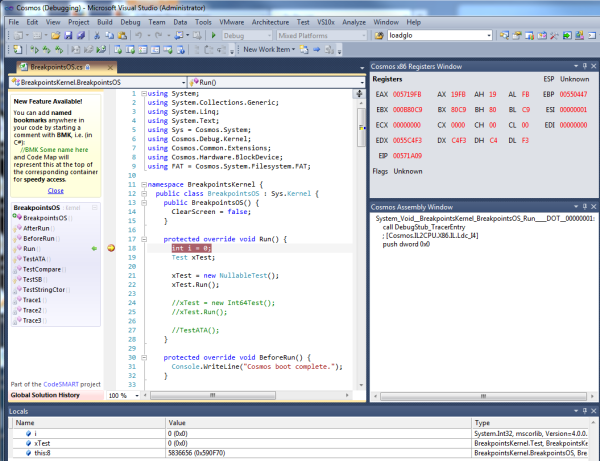
Introduction
Several users have written to me requesting information on the new Cosmos X86 assembly level debugger. Because of the great interest I have written this short preview article.Cosmos already has an integrated Visual Studio debugger for debugging C# and VB.NET code. However to debug the X86 assembly users needed to resort to GDB. Cosmos also included a partial GDB front end, but the linkage between the IL and C# code was lost and requires a lot of mental parsing. Eventually we hope to expand our new assembly debugger so that GDB will only rarely be needed and only for very deep debugging such as the debug stub. The X86 debugger allows you to set a breakpoint in C#, and then see the IL as well as X86 asm, as well as registers.
What is Cosmos?
Cosmos is an operating system development kit (more info) which uses Visual Studio as its development environment. Despite C# in the name, any .NET based language can be used including VB.NET, Fortran, Delphi Prism, IronPython, F# and more. Cosmos itself and the kernel routines are primarily written in C#, and thus the Cosmos name. Besides that, NOSMOS (.NET Open Source Managed Operating System) sounds stupid. Cosmos is not an operating system in the traditional sense, but instead it is an "Operating System Kit", or as I like to say "Operating System Legos". Cosmos lets you create operating systems just as Visual Studio and C# normally let you create applications. Most users can write and boot their own operating system in just a few minutes, all using Visual Studio. Cosmos supports integrated project types in Visual Studio, and an integrated debugger, breakpoints, watches, and more. You can debug your operating system the same way that you debug a normal C# or VB.NET application. Read more: Codeproject



0 comments:
Post a Comment